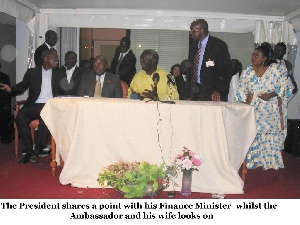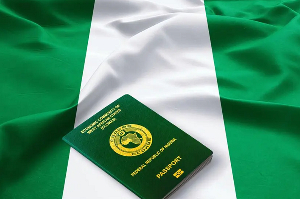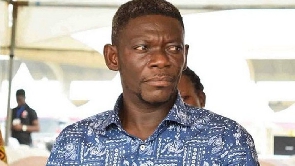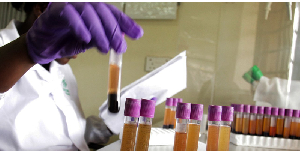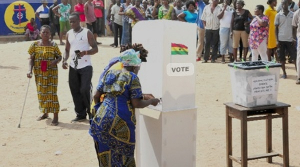Diasporia News of Saturday, 21 October 2006
Source: - Reggie Tagoe in Rome
When President Kufour Met Ghanaians In Italy
An enthusiastic number of Ghanaians resident in Italy gave President J. A. Kufour a rousing welcome at the Ghana Ambassador’s residence in Rome as he found time to meet them during a State visit at the invitation of the Italian Government.
The over 300 Ghanaians waited anxiously to catch a glimpse of the Ghanaian leader after a meeting with Italy’s Head of State Giorgio Napolitano and Prime Minister Romano Prodi.
The sounds of motorcade sirens of smartly dressed Italian Police ushered the Ghanaian President into the exquisite residence at 6:30 p.m, an hour and a half late than originally planned. He was accompanied by Minister for Foreign Affairs Nana Akufo-Addo, Minister for Finance & Economic Planning, Kwadwo Baah Wiredu, the new Ghana Ambassador to Italy Charles Agyei-Amoama and his wife and the Italian Ambassador to Ghana, Fabriizio D’ Agostini
The long wait didn’t mar proceedings of the evening as a group of cultural troupe comprising Ghanaian dancers and Italian drummers performed with the arrival of the President and his entourage.
In his usual reserved fashion, sporting a pale yellowish regular shirt and black trousers, President Kufour told Ghanaians gathered at the meeting the Italian Government have been supporting Ghana in diverse fields and it has reached a point of raising that relationship to a higher plain, hence the reason for accepting the invitation of his host. He said: “From both the President and the Prime Minister of Italy, I learn’t the Ghanaian communities here are well-behaved, hardworking and the Italian people are happy with you. The Prime Minister had the occasion to say on the industrial front of Italy Ghanaians who are working apply themselves very well and he is proud of you”. J. A. Kufour further stated, Italy has offered Ghana 1,000 visas each year for Ghanaians to come and work legitimately in Italy and that the two governments will meet to consider the terms of the agreement. “For the past two days,” he says, “I have witnessed interactions and deliberations of the highest order – so far so good”.
Touching on home related issues, President Kufour made them understand the government has been working virtually around the clock to rehabilitate the country’s socio-economic conditions which over the past five years have been moving progressively and impressively. “Bilaterally and multi-nationally” he noted, “our partner nations are all saying Ghana has put herself back on track.”
There were various areas of the economy that the President spoke on. He indicated inflation has been reduced, interest rates and lending rates have all tumbled from the time the government took office at 50% to between 25% and 20% determined to get it under 20%.
Again he declared; “Our currency has stabilized over the past three years so firmly it is already floating bonds internationally in Cedis and these bonds are over subscribed with the market asking for more, meaning the Cedi has gained recognition internationally.
New roads are being constructed with the highest quality and INFORMATION TECHNOLOGY is also leaping along”.
On the educational front, President Kufour said the government is doing well. “We are building model schools, the target is to give every district of Ghana a model school of the quality of some of the best schools in Ghana. We started with 31 and it’s almost completed. The second batch will be 25 and we will continue to give every one of the 138 districts of Ghana such a school”, the Ghanaian leader pointed out.
The President’s speech was intermitted with loud applause but on each occasion every noise died out as they listened with keen interest and attention. He informed the gathering the government of Ghana is implementing a new education policy by which all children of Ghana from age 4 to 15 will be kept at school, under the constitutionally mandated policy. Free compulsory and universal district education.
This he said is to ensure a child need not be kept out of school because the parents cannot afford the fees: “The happy thing is government is also paying for every school going child a grant of 30,000 cedis and all children will be fed at least one nutritious meal a day. This all at the expense of the State”. He further remarked wherever the State buses are plying all school children will have a free ride to school and back.
The President also spoke on health in Ghana saying the National Health Insurance Scheme has been launched and so far 28% of Ghanaian citizens have registered, the fees he mentioned is 6,000 cedis a month or 72,000 cedis a year for citizens between the ages of 18 and 70 and with that they will have free medical care for all commonly known diseases in Ghana including malaria. At this stage it did seem the President was giving an all round briefing on developments taking place in Ghana and the participants were never tired continuing the focus on the man who took time to shake hands with every participant in the front role of the meeting before taking his seat to begin delivering his speech.
Not of extraordinary elegance from his outfit but it was obvious he commands great respect from his audience. He said the government has been in power for 5 years,10 months and no one can complain of being arbitrary detained or have his assets confiscated without due process of law. Government, he says, has repealed the criminal libel law which gives freedom of speech to the extent members of the media are having a field day, saying, “sometimes to the embarrassment of the government”, but added it’s good for starters to find equilibrium and Ghana is a happy country.
“People can express themselves without fear of detention or molestation and Ghana is being seen as an oasis of peace and stability on the continent of Africa”.
You would have expected with the current spate of striking teachers in Ghana the President will throw some light on the industrial sector in Ghana and he did.
He went on: “We inherited a pay system that was unrealistic and I called for a debate on that 5years ago but against my expectation the debate has not been joined, the way I have hoped for, the Trade Unions, the Learned Institutions and Employers Associations have not addressed the issue though they complained about poor pay.
In spite of that government has since 2001 worked to improve salaries and wages of the work force – a person getting about 3million cedis in 2001 is now receiving over 17million cedis and it runs through the economy, unfortunately, even this improvements is not adequate and I believe the real problem is with the revenue mobilization.
We find that of a nation of population over 20 million at least in the public sector side, only an estimated 500,000 people are paying taxes thus government has not been able to collect enough money to workout what would be a realistic pay system for the public pay which would eventually reflect in the private sector.”
This is the problem government is facing according to the Ghanaian President but says they are determined to face and overcome.
Under foreign relations, President Kufour indicated: “ We came with a policy of good neighborliness and Ghana is living harmoniously with all her neighbors -Togo, Burkina Faso, Cote D’Voire, Niger, Mali and all those in the Region. This is not the case when we took office. Government is determined to achieve the target of middle income within the next decade and therefore laying the infrastructure – roads, energy, industry etc.
Though satisfied with the impressive speech delivered by the President participants were anxious to put forward questions and suggestions.
President of the Council of Ghana Nationals Associations in Italy (COGNAI), Omari Somuah, spoke on behalf of the Council. He gave briefs on the aims and achievements of COGNAI - presently comprising of 17 Associations across the country - and efforts Ghanaians in Italy are making under development projects in Ghana mentioning among them the sending of buses home and GHACOOP which is based in Modena (in the north of Italy) and has set up an agro-based firm in Ghana to introduce Ghana’s agricultural products in Italy.
Somuah commended the Ghana government under J.A. Kufour for the good works it is doing but have some reservations, among them problems confronting Ghanaians resident abroad when they come home to the ports to clear their goods. He pointed out that apart from the long queues personals desert their posts to go on break when people are willing to pay taxes to the government and collect their goods. He also raised the issue on the Ghanaian passport fees saga in Italy and says Ghanaians in Italy are being singled out among their counterparts elsewhere in Europe and are paying higher fees. He lamented on the poor state of security in the country saying the current rate of armed robbery would discourage investors and called on the government to put effective measures in place to check these practices.
His last comment was on the pension scheme in Italy urging the Ghana Government to strike an agreement with their Italian counterpart on how best Ghanaians working in Italy can receive their contributions on the social pension when they want to go home without waiting till the age of 60 or 65 years and work a minimum of 20years as the current Italian law stipulates.
Other questions and suggestions came on identifying every foreigner in Ghana to have proper documentation and naming streets to make peoples’ addresses easily to be traced. Some asked the government to check personals at Kotoka International Airport who insist their fellow Ghanaian passengers on arrival give them gifts before being allowed to leave.
Joana Maison Aidoo. a member of the Ghana Association in Rome, asked President Kufour and his government to reconsider the passport fees in Italy arguing that some workers earn €500 a month and they will be hard put with a family to pay a passport renewal fee of €200.
The Foreign and Finance Ministers took most of the questions and explaining the reasons behind the high fees on passports in Italy, Nana Akufo-Addo said it was a deliberate action from the government in view of higher cases in replacements or missing of passports in Italy as compared to elsewhere in Europe. He stated, since the decision was taken there has been a considerable drop in the number of reported cases. The Minister however said the government will iron out a system and make sure a uniform fee is paid in the Euro Zone when a higher quality Ghanaian passport is introduced.
The Finance Minister tackling the question on the pension scheme for Ghanaians in Italy explained that with the presence of the Italian Ambassador to Ghana the delegation is going to meet the Italian Minister of Cooperation and the issue would be picked among discussions. “ We need to understand the legal system that pertains to the aspect of the pension scheme”, Baah Wiredu concluded his answer.
The event was a remarkable day for Ghanaians in Italy – music went on as the delegates, participants and invited visitors joined to have dinner. OBE TV was present to cover for its wide range of viewers.

